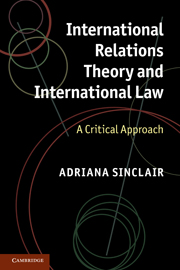Book contents
- Frontmatter
- Contents
- Acknowledgements
- Introduction
- 1 The theoretical foundations of constructivism and its treatment of law
- 2 Challenging the common sense idea of law
- 3 Introducing critical jurisprudence
- 4 Brown, desegregation and racism in America
- 5 Constructing rape
- 6 Law and normative backsliding
- Conclusion
- Bibliography
- Index
1 - The theoretical foundations of constructivism and its treatment of law
Published online by Cambridge University Press: 05 June 2012
- Frontmatter
- Contents
- Acknowledgements
- Introduction
- 1 The theoretical foundations of constructivism and its treatment of law
- 2 Challenging the common sense idea of law
- 3 Introducing critical jurisprudence
- 4 Brown, desegregation and racism in America
- 5 Constructing rape
- 6 Law and normative backsliding
- Conclusion
- Bibliography
- Index
Summary
Introduction
This chapter will provide the bedrock of the book: it will introduce and explore what I consider to be the best efforts of international relations (IR) theory to understand law in general and international law in particular. As noted in the introduction, IR theory has not engaged with the question of law in any sustained manner. The school of thought which has, I believe, made the greatest attempt to understand law is constructivism, and within constructivism, two authors in particular stand out: Onuf and Kratochwil. There are two reasons for this. First, both authors were instrumental in the creation and development of constructivism as a school of thought. In exploring their work therefore, I will be exploring the theoretical foundations of constructivism. The theoretical focus of their work also predisposes it to addressing questions about the nature of society, norms and ultimately law. Constructivist analysis was definitively shaped by Keohane’s injunction to answer empirical questions of international politics. Throughout the 1990s therefore a substantial portion of constructivist work was empirically oriented and this drew attention away from questions of law. I will return to more empirical constructivist work in chapter 6 to see what role law plays in their analysis and specifically address the question of normative backsliding.
But, to return to Onuf and Kratochwil, there is a second reason for selecting them from all other constructivist writers: they explicitly write about law. As noted in the introduction other IR theory accounts of international law suffer from two flaws. Moreover, they approach the question of law in an explicitly theoretical way and this gives us a far better chance of answering the questions about international law that IR theorists are interested in answering: what should we expect law to be able to do for us? What is law’s causal power?
- Type
- Chapter
- Information
- International Relations Theory and International LawA Critical Approach, pp. 7 - 36Publisher: Cambridge University PressPrint publication year: 2010



